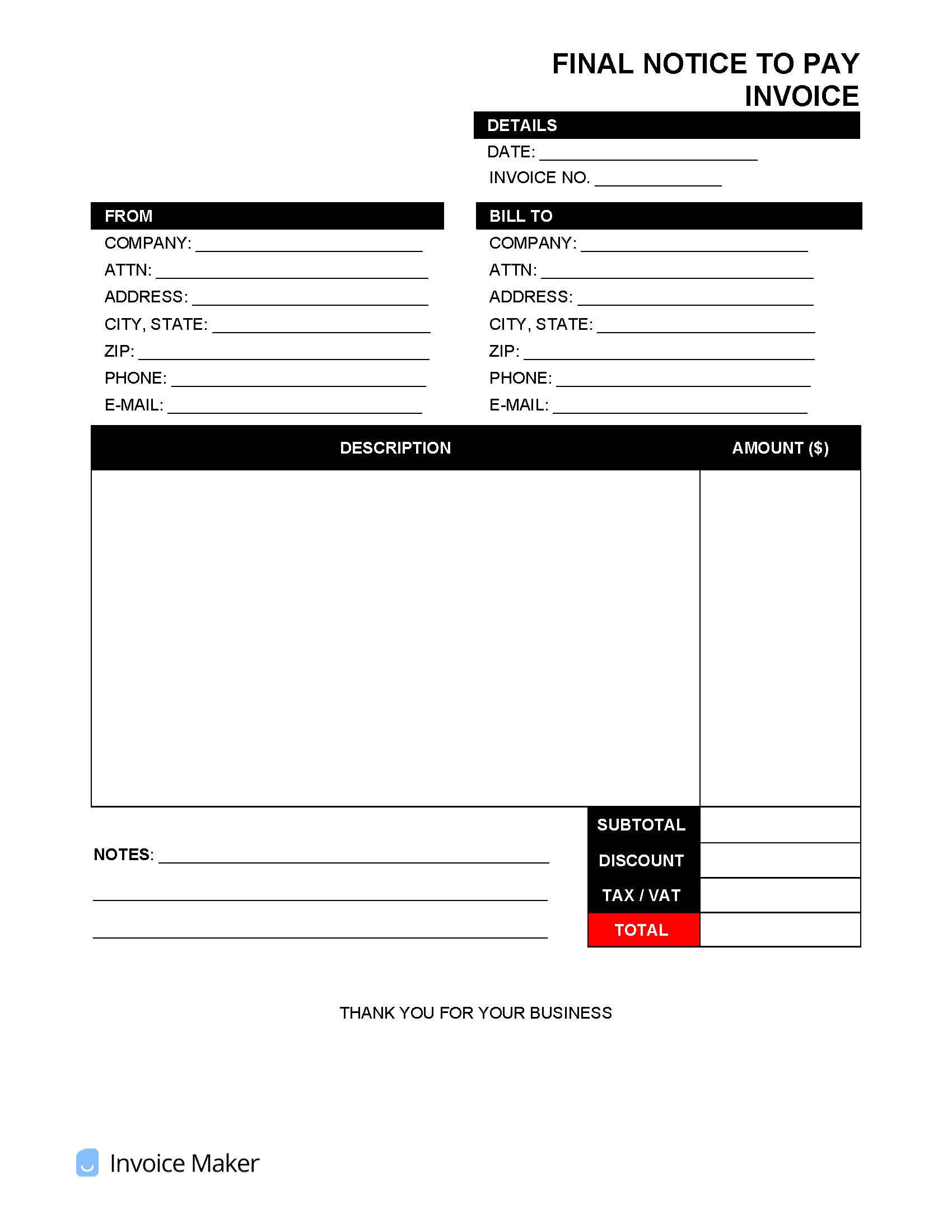Final (Last Notice to Pay) Invoice Template
The final notice to pay is an invoice that shows a party how much they owe, including any late fees and penalties. The invoice will also detail when the payment is due and, if not paid, what will happen to the amount. In most cases, the amount will be sent to collections and credit reporting agencies which will be reflected in the debtor’s rating.
What is a Final Notice?
A final notice to pay is a last attempt to relinquish a debt from a debtor (past client or customer). A final notice is meant to warn the debtor that the account will be sent off to a collection agency if the debt goes without being paid. If the debtor cares about their credit score, they will take the final notice seriously and pay the debt. A final notice should get the following messages across:
- The creditor is no longer willing to work with the debtor and demands payment now
- The amount of time that the debtor has to cure the debt (no wiggle room with time)
- Consequences for not paying the debt
Any business, service, or government agency with a past-due account with a customer may send out a final notice to pay when they feel that the debtor is no longer holding themselves accountable. Typically creditors will allow a debtor to make a minimum payment on a debt (a small percentage of the full amount owed) before a payment becomes past due. A final notice is issued when a creditor sees that a debtor is unwilling to pay the minimum payment on a past due account. Medical Bills – Due to a 2015 Settlement, patients have at least one-hundred and eighty (180) days to pay a medical bill before it appears on their credit report.
Know Your State Laws
Each state is different when it comes to collections and the consequences they might have for a debtor. Chances are, the debtor is unaware of the state laws regarding an account going to collections. The debtor may already have a bad credit score; therefore, if the final notice letter only mentions the repercussions non-payment will have on their credit report, it may not be enough of a selling point to get the debtor to pay. For example, if the debtor is located in California, a collection agency has the power to impose a wage garnishment on the debtor’s paycheck until the debt is repaid. Also, if the debtor has a home or a vehicle titled in their name, it’s fair game for a collection agency to go after those assets. By knowing the state laws that protect (or lack thereof) consumers from the hazards of unpaid debt, that information can be handy when including it in a final notice to make the debtor aware of the potential consequences.
Helpful Tip: Collection agencies are regulated by the Fair Debt Collection Practices Act (FDCPA) to protect the consumer from malpractice such as harassment and unfair practices. Make sure that you are aware of these laws before making an attempt to collect unpaid dues from a debtor.
Collections Letter Template Example
Use the collection letter below, or a similar letter, and attach it to the last notice invoice when serving a debtor. Dear _______________ (debtor) This is the final notice to pay in the amount of $_______________ (total amount due). Payment is due upon _______________ (due date). You will have _______ days from now to pay the full balance of your account before your account will close. Upon closure of your account, the balance will be placed with a collection agency. Be aware that unpaid balances sent to collections can negatively affect your credit score. Please call us immediately at _______________ (phone number) to make arrangements with your payment. Sincerely, (Company Name) Telephone Number: Email:
